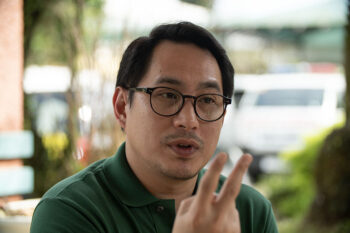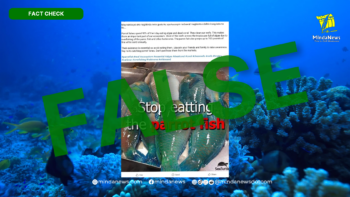
ZAMBOANGA CITY (MindaNews / 12 June) – Maybe I’m one of the few Pinoys who regularly look into monthly advocacy officially declared through presidential proclamations. The complete list is available online through the Official Gazette website (https://www.officialgazette.gov.ph/calendar/). For many Filipinos, a proclamation such as this one means a public holiday.
I started to veer away from this stereotype when I was pursuing my nursing studies (yes, I am a Registered Nurse by profession) as we were acculturated to health advocacies spread throughout the calendar year – January is deworming month, February is heart month, March is rabies awareness and so on. A more detailed health advocacy calendar is available on the Department of Health (DOH) website (https://doh.gov.ph/healthcalendar). For each month, there is month-and week-long advocacy and a day for this and that. The purpose is to put a spotlight on a particular health issue or disease in order to create awareness, prevent its unnecessary spread, promote healthy behavioral change, and importantly, to get decision-makers and stakeholders together to support the cause.
There is also the practice of highlighting particular actions through a thematic statement. For example, this year’s kidney month observance is focused on the theme, “Bato Kong Alay Bago Mong Buhay” (My kidney offering is your new lease on life), to highlight kidney donation in the country. The theme is not just about having a common topic or talking points, but it is to highlight this year’s focus. This means organ donation should not be for sale or in exchange for money. It should be done voluntarily. In other countries, they have established organ donation banks to harvest donation at a stated time, e.g. immediately upon death; and all donors carry a card with them showing they have voluntarily signed themselves to be an organ donor; and a centralized database allows the health department to match organ needs with donors. This is something we have not fully implemented in our country.
Then there are the cultural taboos associated with organ donation which need to be addressed. Organ donation saves lives. It is a human thing to do and it is done in the most humane way possible. How many have seen Korean teledrama or movies where a deceased donor, after his or her organ(s) had been harvested in an operating room, is wheeled to the morgue and on its way out, medical and other health personnel on duty lined up along the hospital corridors to pay their respect? We need also to rally our religious leaders to take a look and this issue and find common grounds in respective scriptures to support humanity.
Since then I have carried this consciousness as I move around professionally. In government, the more active agencies and programs are the ones that tend to get media attention or tend to be observed more visibly than the rest. E.g., Nutrition month in May, Environment month in June, Buwan ng Wika in August, September is Teacher’s Month and October is Scouting Month. Agencies like the Civil Service Commission and Philippine Women’s Commission send communication a month before their Civil Service Month in September and Women’s Month in March to the line and local agencies encouraging them to hold these observances, specifying annual theme, appropriate activities, and even suggesting colors and designs for a tarpaulin to be hung in conspicuous places. Observances of these natures are working holidays and government agencies and even transacting private entities put up streamers to support them.
There are a few non-working holidays when government offices and schools are closed for it nationwide. This includes Independence Day (June 12), Ninoy Aguino Day (August 21), the long Christmas and New Year holidays in December and January and the Muslim Eid holidays. There are also regional and local non-working holidays.
Outside of the non-working holidays, one of my motivations for following on these monthly observances is they are timely reminder of what is important for the given month and for the long haul. Take this month of June. It is Sea Transportation Safety Month, Rural Workers Month, Philippine Environment Month, Celebrate the Sea Month, National Information and Communications Technology (ICT) Month, and W.A.T.C.H. (We Advocate Time Consciousness and Honesty) Month.
Health-wise, June is Prostate Cancer Awareness Month, National Cancer Survivor Month, Scoliosis Awareness Month, Dengue Awareness Month, National No Smoking Month, National Kidney Month, and National Dengue Awareness Month. The third week of the month is National Safe Kid Week, the fourth week is National Poison Prevention Week and the last week of June is National Organ and Blood Donation Awareness Week. Finally, there are also particular days to observe this month – June 14 is World Blood Donation Day, June 15 is ASEAN Dengue Day, June 23 is DOH Day and June 26 is International Day Against Drug Abuse and Illicit Trafficking. Whew! How many of these advocacies are we even aware of?
Unless these advocacies make meaning in our lives, they remain tarps after tarps posted on government buildings, public places, and along our highways. What is then the personal, familial, and communal meaning of these advocacies? This is where my personal motivation hinges. Advocacy reminds us of a lot of things from month to month. June is Sea Transportation Safety Month, reminding us to be careful traveling especially us from the island provinces who also commute via ships and boats of many forms and sizes. We often ride boats and ships without even taking time to take note of emergency procedures, equipment, and exits posted on ship walls, and yet these pieces of information are crucial to our personal and family safety.
June is about rural workers. In this time and age, most of us are migrating to cities and overseas to seek jobs and greener pasture. We attribute success to these places. We have not really thought about rural work and rural workers. The stereotypical getting away from “trabaho sa bukid” is very strong among us, despite the past contribution of this sector and still unexplored many potentials to help move our country forward. I personally like programs like the DICT’s rural impact sourcing program which allows techy youths to access global jobs while remaining in their rural barangays. If only we can have more of this to a level where we slow down urban migration, the growth of urban slums, and the depopulation of our rural areas. And this where advocacy about rural workers and the National Information and Communications Technology (ICT) Month observance blend. Yes, I agree the connectivity infrastructures and quality of data signals need to be democratized and improved to achieve this blend.
Being on time in this time and age is a measure of professionalism and productivity and this is why the W.A.T.C.H. (We Advocate Time Consciousness and Honesty) Month advocacy is equally important. We need to discard the mañana and ‘late is cool’ habits. It is time to say if you are the boss you have to be a model of time consciousness, just as we expect government personnel to be honest with their time observance. In layperson’s lingo, “kumpleto sweldo, pero kulang sa trabaho” (getting paid in full, but deficient in productivity).
I believe after this pandemic, among the important concerns we need to focus on as a society is mitigating climate change. For Indian physicist and world-renown environmental activist, Vandana Shiva, climate change is a euphemism. In reality, we are now in a climate crisis. This is why, June as Philippine Environment Month and Celebrate the Sea Month needs to be taken advantage of, not merely in terms of complying with an official directive, but in terms of ensuring that the present generation is acting on mitigation seriously and that the next generation is made aware of it and that they are growing up with a proactive mindset and necessary behavior change towards a greener, better and sustainable future.
This is the meaning of advocacy. Unless we make it part of ourselves, nothing will change. We will merely repeat the mistakes of the past. Francois-Marie Arouet or as popularly known, Voltaire, once said, “History never repeats itself; man always does.” In Islam we are reminded, too, the people’s condition will not change until they change what is in themselves. This is how we begin to change when we hear the words ‘observance,’ ‘celebration,’ and ‘advocacy,’ from month to month.
(MindaViews is the opinion section of MindaNews. Noor Saada is a Tausug of mixed ancestry – born in Jolo, Sulu, grew up in Tawi-tawi, studied in Zamboanga and worked in Davao, Makati and Cotabato. He is a development worker and peace advocate, former Assistant Regional Secretary of the Department of Education in the Autonomous Region in Muslim Mindanao, currently working as an independent consultant and is a member of an insider-mediation group that aims to promote intra-Moro dialogue.)







